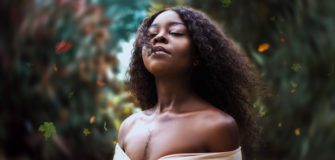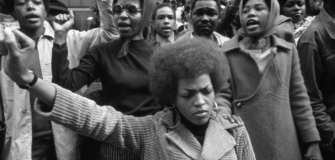Celebrating Upspoken Women Past and Present
Share
As we end Black History Month and enter Women’s History Month, we’re celebrating groundbreaking women who put zero limits on themselves and are constant examples of how to show up and show out. The queens below are just a few of the unapologetic Black women, past and present, who inspire us to embrace life openly and fully as Upspoken women.
Robyn Rihanna Fenty
“The minute you learn to love yourself you won’t want to be anyone else.”
Artist turned beauty and fashion mogul, Rihanna, keeps us guessing when she’s going to drop that new album (seriously come on, sis) and keeps inclusivity trending with her makeup line that opened up the world of luxury makeup to every shade outside of beige and her lingerie line that makes every woman feel beautiful no matter their size. But where Rihanna really shines is not in the businesses she runs, but in the service she does and the use of her platform to share the needs of our community. And as this year’s recipient of the prestigious NAACP President’s Award in recognition of her charitable work, she did not disappoint. Rihanna reminded us that the work of changing the world should not always have to fall on our shoulders, and that people aren’t entitled to our culture without being an ally to reduce our pain.
Mariame Kaba
“Being hopeful is the belief that when we put our effort together, that it’s possible for us to change the trajectory of things that are unjust.”
Mariame Kaba is an OG in the world of justice, using her voice for nearly 25 years to educate, organize and advocate for racial, gender, and transformative justice and dismantle the prison industrial complex. She stays dropping knowledge on politics and movements for justice while opening eyes to the daily experience of those touched by the criminal justice system. She knows that when the right people come together, they can build immense power that can dismantle systems and is a constant reminder that we can’t stop pushing if we want to change the world.
Marian Wright Edelman
“You’re not obligated to win. You’re obligated to keep trying to do the best you can every day.”
Marian Wright Edelman has been teaching us how to fight since even before she became the first Black woman admitted to the Mississippi Bar in 1964. Since that time she has worked tirelessly as a civil and children’s rights advocate, founding what has become the nation’s strongest voice for children and families, the Children’s Defense Fund. A recipient of over a hundred honorary degrees and the Presidential Medal of Freedom, among other honors, Ms. Edelman shines bright in all her Black excellence and stays showing us that half the work of being Upspoken is simply deciding to show up.
Katherine Johnson
“Girls are capable of doing everything men are capable of doing.”
In 2017, Katherine Johnson became a hidden figure no more, and along with her colleagues—Dorothy Vaughn and Mary Jackson—finally got all the flowers she so richly deserved for her work as the NASA mathematician whose calculations made the success of manned space flight possible. She will long be remembered for her brilliant mind and a drive and determination that simply would not allow for anything other than the success she deserved.
Ava DuVernay
“We have to find new ways to turn corners and go through doors that are closed off to us to create our own audiences and our own materials independently.”
While Ava DuVernay may have gotten a later start than most filmmakers, she has been at the forefront of a new golden age of Black filmmaking, bringing the stories of Black people to life authentically and truthfully in films like Selma and her series about The Exonerated Five, When They See Us. But beyond what we see on the screen, she’s shown time and again, she’s really about that life. By intentionally using her increasingly powerful position, she continues to bring attention to injustice and swing the door of opportunity wide open to create more space for those who have been marginalized to tell their own stories.
Rae Lewis-Thorton
“In the real world, what women need to hear is that they have to love themselves more than they need a partner to love them.”
It was 1994 when Rae Lewis-Thorton unapologetically announced to the world via the cover of Essence her status as a Black woman with HIV. In that moment she showed just what we mean when we talk about being Upspoken. She faced the world head on as her full self and demanded to be seen when so many others would have preferred she stay hidden. Now 15 years later, this she-ro is living a full life with HIV and using her voice to educate women that self-care starts with their sexual health.
Florence “Flo-Jo” Griffith Joyner
“When anyone tells me I can’t do anything, I’m just not listening any more.”
We stan a queen who could run sub-11 second 100 m races and look flawless doing it! Instantly recognizable by her flashy track wear and equally flashy nails, Flo-Jo was a track and field beast who commanded attention. In 1988 she set the world records in both the 100m and 200m that still stand today. On and off the track, Flo-Jo was an icon who moved at her own speed and demanded that the world catch up rather than that she ever slow down.
Zora Neale Hurston
“Sometimes, I feel discriminated against, but it does not make me angry. It merely astonishes me. How can any deny themselves the pleasure of my company? It’s beyond me.”
This literary queen’s work dates back to the Harlem Renaissance, a time when she used her talents as a writer to not only discuss racial struggles, but also the joy of Black communities. Her commitment to using southern Black vernacular and focusing on love at a time when Black intellectuals wanted to separate themselves from the Jim Crow South and use their work to highlight political tensions opened her up to intense criticism, especially from her male peers. But, Hurston always remained true to herself and her voice, writing the stories that captured her view of Blackness and womanhood.
Joycelyn Elders
“I am who I am because I’m a black woman.”
Joycelyn Elders was a master at dropping knowledge that just hit different. As a sharecropper’s daughter, she became the first Black Surgeon General of the United States and was an early advocate for hand gun regulation and violence prevention, drug legalization, and sex education that included the distribution of condoms and discussion of masturbation. While her ideas were deemed controversial at the time, she never shied away from being Upspoken about the issues she felt impacted Black communities most and would improve the health and well-being of the entire American public, even when doing so resulted in her being dismissed as Surgeon General. Elders is an icon in every sense of the word and continues to use her voice to advocate for justice and health.
Ella Baker
“We who believe in freedom cannot rest until it comes.”
Ella Baker was a gifted organizer and fighter for Black freedom who knew who tap into the power of Black people and get them into formation and played a critical role in the success of three of the most prominent organizations of the civil rights movement. #Facts: Baker was the first woman to be elected President of the New York NAACP Chapter, set the agenda for the the Southern Christian Leadership Conference (SCLC) and organized a days-long conference of young people that ultimately led to the formation of Student Nonviolent Coordinating Committee (SNCC). Too often women’s leadership is overlooked when we discuss the civil rights movement, but Upspoken women like Ella Baker prove that even while our work may not not get the same name recognition as men’s, we’ve never taken a back seat when it comes to getting the work done.




Follow Us